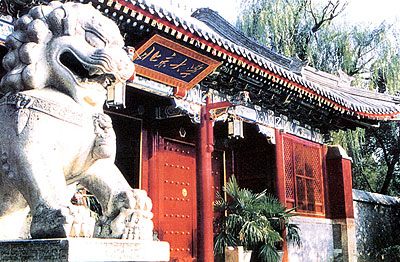| May 4 this year marks the 110th anniversary of Peking University, the first national university and the earliest higher education and scientific research center in China.

The university's west gate shows traditional architectural features
A special website was launched by the University on March 15, exactly 50 days before the occasion, kicking off celebrations. The main campus, known as Yan Yuan (literally, "the Gardens of Yan"), located in the western suburbs of Beijing, will see various activities in the following months, including galas, exhibitions, academic seminars and lectures, on-campus cultural festivals, alumni reunions, and so forth.
A decade in change
Luo Ling, 28, a gradute from Peking University, still remembers the live television broadcast of the University's 100th anniversary, which she watched in her hometown in central China's Hunan Province.
"I was preparing for the national college entrance examinations at that time, and made up my mind to go to Peking University after watching the gala. It was my dream place," says Luo.
The University is extremely selective. Every year only the top students from each province across China are admitted, making it one of the most prestigious universities in the country. Fortunately for her, Luo's dream came true.
What Luo gained from campus life was not limited to her dual bachelor degrees in economics and master's degree in international studies. Her overall views were broadened and her communication abilities were enhanced, thanks to the frequent international exchanges offered by the University. Since 1998, more than 40 heads of state have visited Peking University. She was part of the reception committee for such dignitaries as Henry Kissinger, former head of U.S. State Council, Kofi Annan, former Secretary-General of the United Nations, and Bill Gates, Microsoft CEO.
Moreover, between 2001 and 2005, the University organized 269 international academic conferences, centered on subjects ranging from politics, economy, physics, medical sciences, to geography, education, and biochemistry. As of 2006, it has conducted exchange programs with 201 universities from 51 countries and regions. Every year, the foreign staff involved in teaching totals 500; the number of international exchange students, short term and long term, hits 4000.
"The increase in international exchanges offers more access and chances to students. By the same token, it also helps to promote and expand the University's influence and reputation worldwide," says Luo, who currently serves at the University's Office of International Relations.
Luo's point of view is echoed by Li Yansong, Director of the Office of International Relations and Assistant President of the University.
"We will improve the composition of disciplines by effectively integrating resources within the campus," said Li. "For example, joint laboratories will be introduced to upgrade our scientific strengths to international levels; as a new model of international exchange, trans-discipline research centers will be initiated as well, which will offer more access to teachers and students."
A more open mind
One of the net results of the increasing international exchanges is the upgrading of the on-campus facilities.
"Blackboards played a major role when I was an undergraduate majoring in life science," said Shi Yonghui, a staff member of the P&G Group. "Multimedia teaching was not introduced until I started my master degree. If I were given the second chance, I would definitely choose multimedia, because it's very convenient."
The curriculum they had some ten years ago, according to Shi (who just graduated from the University with a doctorate) seemed to lag behind international levels; today, with lectures and seminars offered by leading scholars in related areas at home and abroad, the world's latest scientific results, trans-discipline and dual-degree courses are now available and open to students, thanks to the University's open policy.
"The core value of Peking University is the talent. Breeding and cultivating innovative graduates with international views and high quality for the country is our main goal," said Lin Jianhua, Executive Vice President of the University.
Xu Zhihong, incumbent President of Peking University, further explored the goal in a recent interview with Science Times newspaper.
| 